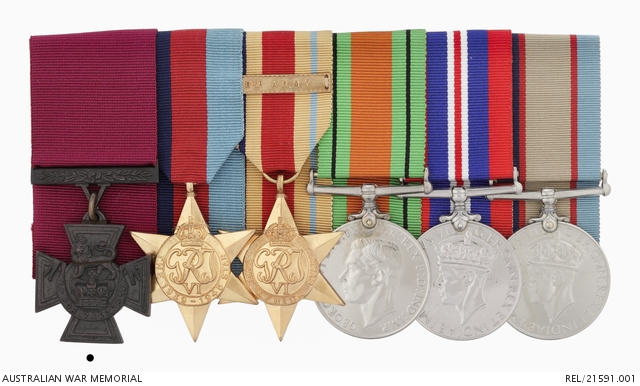| Place | Africa: North Africa, Western Desert, Western Desert (Egypt), El Alamein Area, El Alamein |
|---|---|
| Accession Number | REL/21591.001 |
| Collection type | Heraldry |
| Object type | Award |
| Physical description | Bronze |
| Location | Main Bld: Hall of Valour: Main Hall: El Alamein |
| Maker |
Hancocks |
| Place made | United Kingdom: England, Greater London |
| Date made | c 1942 |
| Conflict |
Second World War, 1939-1945 |
Victoria Cross : Sergeant W H Kibby, 2/48 Battalion

Victoria Cross. Engraved reverse suspender with recipient's details; reverse cross with date of action.
William Kibby was born on 15 April 1903 in Winlaton, England and migrated with his family to Adelaide in 1914. By 1940 Kibby was a fibrous plasterer with a wife and two daughters. He enlisted in the AIF on 29 June and was posted as private SX7089 in 2/48th Battalion. He embarked with the battalion from Adelaide in November, bound for the Middle East. Following an accident shortly after arriving, resulting in a broken leg, Kibby did not return to his unit for over 12 months.
During fighting at El Alamein between 23 and 31 October 1942, Kibby took command of his platoon when his commander was killed, and was then ordered to attack strong enemy positions. He personally assaulted an enemy post, firing his Thompson sub-machine gun, killing three of the enemy and capturing 12 others. On other occasions he showed great leadership, directing fire and encouraging his men. He was killed by machine-gun fire on the night of 30-31 October; his work was said to have been "an inspiration to all". For his actions at El Alamein Kibby was awarded a posthumous Victoria Cross. The citation for the award reads:
'During the initial attack at Miteiriya Ridge on 23rd October, 1942, the Commander of No. 17 Platoon, to which Sergeant Kibby belonged, was killed. No sooner had Sergeant Kibby assumed command than his platoon was ordered to attack strong enemy positions holding up the advance of his company. Sergeant Kibby immediately realised the necessity for quick decisive action, and without thought for his personal safety he dashed forward towards the enemy post firing his Tommy-gun. This rapid and courageous individual action resulted in the complete silencing of the enemy fire, by the killing of three of the enemy, and the capture of twelve others. With these posts silenced, his Company was then able to continue the advance.
After the capture of Trig 29 on 26th October, intense enemy artillery concentrations were directed at the battalion area which were invariably followed with counter-attacks by tanks and infantry. Throughout the attacks that culminated in the capture of Trig 29 and the re-organisation period which followed, Sergeant Kibby moved from section to section, personally directing their fire and cheering his men, despite the fact that the Platoon throughout was suffering heavy casualties. Several times, when under intense machine-gun fire, he went out and mended the platoon line communications, thus allowing mortar concentrations to be directed effectively against the attack on his Company’s front. His whole demeanor during this difficult phase in the operations was an inspiration to his platoon.
On the night of 30th-31st October, when the battalion attacked "ring contour" 25, behind the enemy lines, it was necessary for No. 17 Platoon to move through the most withering enemy machine-gun fire in order to reach its objective. These conditions did not deter Sergeant Kibby from pressing forward right to the objective, despite his platoon being mown down by machine-gun fire from point blank range. One pocket of resistance still remained and Sergeant Kibby went forward alone, throwing grenades to destroy the enemy now only a few yards distant. Just as success appeared certain he was killed by a burst of machine-gun fire. Such outstanding courage, tenacity of purpose and devotion to duty was entirely responsible for the successful capture of the Company's objective. His work was an inspiration to all and he left behind him an example and memory of a soldier who fearlessly and unselfishly fought to the end to carry out his duty.'
A quiet and sincere man, Kibby often told friends that all he wanted was to return to his wife and two daughters and his garden in Glenelg, Adelaide.
Kibby's Victoria Cross is accompanied by service medals for the Second World War.